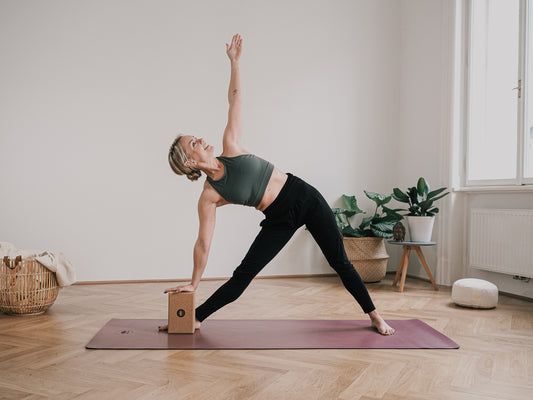
NEW In!
PURE-Matte Light TaupeShopping cart
Your shopping basket is empty
Free shipping from €39
Produced Ecologically & Fair
For All Yoga Styles
Yoga

Meditation
Sets & Bundles
Like our breath, sleep accompanies us throughout our lives. It is a self-evident basic need that we usually only think about when we don't have enough of it. So that it doesn't get that far, we've put together our best tips for falling asleep and staying asleep.
 Why restful sleep is so important
Why restful sleep is so importantCountless studies confirm the importance of good sleep for health and well-being. When we sleep we recover, body and mind can regenerate and we draw new strength and energy. Nevertheless, the nocturnal rest phase is not appreciated enough by many people. We work out, rush through the day and often continue to spend the evening in front of screens and smartphones instead of developing a healthy sleep routine.
Unfortunately, chronic lack of sleep is not uncommon in our restless society. Anyone who sleeps little is considered to be particularly ambitious and productive. Exactly the opposite is the case: Persistent lack of sleep causes our energy levels to drop, makes us more irritable, less concentrated and weakens the immune system. Beauty also suffers from insufficient sleep: the skin ages quickly, the complexion looks dull and the eyes appear tired.
The good news: Even with simple routines, the quality of sleep can be significantly improved. Anyone who wakes up feeling refreshed and rested in the morning will certainly not want to do without the soothing bedtime rituals!
Create a pleasant atmosphere
Especially before going to bed, it is advisable to relax your senses and direct your attention more inwards. So avoid bright lights or loud noises. Ideally, you declare the bedroom a restricted zone for technology of all kinds: If your cell phone, tablet and television are not within reach, you are not even tempted to spend your evening thoughtlessly switching or scrolling. It is much better to pick up a good book or write down your thoughts in a journal. Don't forget to clean up the mess in the sleeping area! In an orderly environment, a busy mind is easier to soothe. Earplugs and a sleep mask can also contribute to restful sleep.
Assess your sleep needs
Early risers, morning grouches, night owls, late risers - not everyone is the same and does not have the same needs. While some people get by with very little sleep, others only really wake up after 8 hours. It is therefore important to know your own sleep needs and to live accordingly. How, when and how long we sleep also depends on many other factors, such as the climate, the season, age or the current state of the day. However, there are a few basic rules that apply to all of us:

We encounter the principles of yin and yang in all areas of life: heat and cold, summer and winter, strength and rest. The fact that day is assigned to yang and night to yin already indicates that the yin practice has a particularly beneficial effect on the organism, especially in the evening. Unlike more dynamic and powerful yoga styles, yin yoga involves staying in passive stretches for a few minutes. It is not the muscles that are addressed, but the yin tissue, i.e. joints, bones, tendons and fascia. This regenerating practice helps to put the body into a resting mode and thus ideally prepares you for the night. Yin exercises that promote sleep:
Tortoise:
Sit on a pillow or blanket with your knees bent. Place the soles of your feet together, let your head and upper body sink forward and relax your neck. If you want to go deeper, you can “thread” your arms underneath your legs and put them down.
Caterpillar:
Sit on a pillow or blanket with your legs straight. Let your head and upper body sink forward, relax your neck and put your hands or forearms down comfortably.
Banana or crescent moon:
Lie on your back. While keeping your buttocks in place, move your heels a little to the right. Grab your left wrist with your right hand and also move your arms, shoulders and head slightly to the right. Repeat the exercise on the other side. Stay in each yin yoga pose for about 3-5 minutes, preferably with your eyes closed.
In the so-called “deep sleep of the yogis”, a voice guides you through a body journey similar to autogenic training. The approximately 20-minute session (e.g. can be found on CD, YouTube or Spotify) is designed to keep you fully conscious while body and mind can slide into a deeply relaxed state. Yoga Nidra can be practiced not only before bed but also at any other time of the day. Up to three hours of sleep can be "catched up" with this practice.
Snuggle up on the sofa with a cup of tea, light a scented candle, do gentle yoga exercises or meditation, take a soothing bath... you know best what is good for your soul! Create your personal bedtime ritual, for which you consciously take time every day. Important: Try to find a routine that you keep unchanged over a longer period of time. In this way you set the impulse for a healthy habit, which your brain will automatically associate with a good sleep feeling after a while.

Especially as a yoga newbie you will be confronted with many terms that may be completely unfamiliar to you. Pranayama, Mudra & Shavasana - an...
Continue reading
Christmas is just around the corner and with it the questions: What am I giving away this year? And what do I wish for? How about more mindfulne...
Continue reading